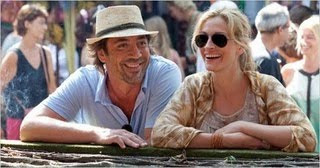Lovely title, especially for the first ebook that I have read on my Kobo, but not a lovely subject.
Reading by moonlight by Brenda Walker, subtitled
how books saved a life, describes in five sections; surgery, radiation, chemotherapy, reconstruction and survival, the author's thoughts, feelings and fears about breast cancer and, alongside those, her reactions to and her understandings of the books that were important reading for her at the time.
This book is full of metaphor and quotable insights and I found it a mesmerising, lyrical read. Walker is a teacher and writer in Western Australia and has succeeded in explaining cancer diagnosis, treatment and rehabilitation in a hopeful, inspiring way.
She commented that she "likes to read books that show us ways other people deal with problems" and
Reading by moonlight is itself a perfect example.
I have read several novels that explore women's reactions to cancer; interestingly two that I would recommend are also by Australian writers and the third is by Stella Duffy who spent her childhood in New Zealand.
In
The Spare room Helen Garner writes about the joys and limits of female friendship under the pressure of terminal illness. This book is both angry and funny and shows the resourcefulness of the characters when faced with medical and social difficulties. Books and writing play a part here too and Helen Garner chooses her words carefully to add atmosphere.
Debra Adelaide's novel
The Household guide to dying is also funny whilst dealing with the sadness of a younger woman and her terminal cancer. There are links to books here too as Delia, the narrator and cancer sufferer, is the author of a series of
Household guides usually
containing more than the expected domestic content. That is also the case with
The Household guide to dying since she can write chapters on Wills and wishes and Funeral festivities, including paint your own coffin, but she cannot write the chapter on the afterlife as she has not reached there yet!
There is much domestic detail and family consideration that is empathic for the reader. Indeed there is much empathy and sympathy in this novel. I wept.
Cindy, the narrator in the
State of happiness by Stella Duffey, is not a writer but a map-maker but there are also revealing metaphors here as she deals with a progressive disease. The writing is cool, almost clinical and not emotional but it still has an impact that stayed with me after I finsished reading. One reviewer wrote "It's perfectly possible (once you've recovered from the reading) to use this remarkable book as a resource and have some coping strategies in the knowledge store because Stella Duffy made me think quite clearly and lucidly around what would I do, what would I feel, how would I deal with it, would I be like Cindy?"
And I think that's what Brenda Walker meant about learning from books.




















































